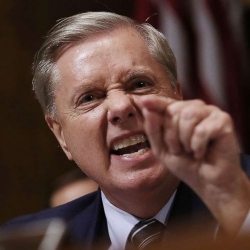
Sen. Lindsey Graham began as a Never Trumper, but now supports Donald Trump and golfs with the US President.
US Sen. Lindsey Graham (R-South Carolina) plans to use the Senate confirmation hearings of Attorney General nominee William Barr to make online gambling an issue. Lindsey Graham has made two previous attempts to pass Restore America’s Wire Act (RAWA), a bill which would ban online casinos and poker sites in all 50 states.
According to Gambling Compliance, Senator Graham plans to make one of his first questions about William Barr’s stance on the 2011 Department of Justice opinion on online gambling.
The 2011 DOJ opinion from the Office of Legal Counsel (OLC) opened the door for individual states to legalize, license, regulate, and tax online gambling.
Graham wants either an written or verbal stance from Bill Barr on the 1961 Wire Act, which is at the heart of the Restore America’s Wire Act and other attempts to ban online gambling.
1961 Wire Act Interpretations
In Lindsey Graham’s interpretation, the Wire Act should apply to online casino gambling and poker betting — not just sports betting. The South Carolina senator contends that the 2011 DOJ opinion undermines decades of legal tradition by stating that sports betting was the only form of gambling covered under the 1961 Wire Act.
The 1961 Wire Act stated that interestate sports betting over the telephone lines was illegal. It was a law designed to catch organized crime engaged in racketeering. Because people could not make poker, blackjack, roulette, or slots wagers over the phone lines in 1961, the Wire Act did not mention those forms of gambling.
2006 UIGEA Interpretations
When the Unlawful Internet Gambling Enforcement Act (UIGEA) was passed in 2006, it stated that all forms of gambling banned in the Wire Act (for phone lines) would be banned under UIGEA (on the Internet). In the Bush Administration and first couple of years of the Obama Administration, UIGEA was taken to cover online sports betting, online casinos, and online poker. In late 2011, the state attorney generals of Illinois and New York state asked the US Department of Justice for an opinion on which forms of gambling the wire act covered.
The DOJ replied sports betting was the only form of gambling covered, because it was the only one specifically mentioned in the Wire act and it would have been impossible to bet on casino table games, slot machines, and poker on the phone. Thus, the UIGEA only covered sports betting.
Many opponents of RAWA point out that casino gambling and poker were not banned for decades, the way Lindsey Graham contends. When Graham first championed RAWA in 2014, he was opposed by a broad range of conservatives, because they said Graham was trying to expand federal authority at the expense of states’ rights. Grover Norquist, Rand Paul, and Ron Paul all were outspoken critics of RAWA.
Lindsey Graham in AG Confirmation Hearings
That did not deter Sen. Graham. During Loretta Lynch’s attorney general confirmation hearings in 2015. Graham claimed that New Jersey online gambling imposed on the South Carolinians he represented online gambling, because anyone in South Carolina with a smartphone could play on New Jersey online sites.
That was, of course, false, because the same kind of geolocation software on people’s GPS systems in their cars assures only players inside New Jersey can play. That is not to say Lindsey Graham tried to deceive in his statements; Graham is famous for using the Internet or mobile phones very seldom. He has trumpeted his lack of knowledge about 21st century communications technology.
Jeff Sessions Era
Despite his lack of expertise, Sen. Graham asked similar questions again during Jeff Sessions’s AG hearings in 2017, Lindsey Graham asked pointed questions about online gambling. Lynch supported the 2011 DOJ opinion, while Jeff Sessions said he was “shocked” by the opinion.
Though Sessions’ indicated he might oppose online gambling in the confirmation hearings, he appeared to be paying lip service to RAWA support. During his nearly two years as the head of the US Department of Justice, Jeff Sessions never reviewed the 2011 DOJ opinion.
Marco Rubio Supported RAWA
In fact, few Republicans or Democrats seem interested in a 50-state online gambling ban. Former US Rep. Jason Chaffetz (R-Utah) supported the RAWA bill. So did Sen. Marco Rubio (R-Florida), who signed on as a co-sponsor the week before he announced his run for president in June 2016.
Most saw Rubio’s support as a sign he wanted to curry favor with Sheldon Adelson, the GOP mega-donor who is the prime mover behind Restore America’s Wire Act. In fact, any politician who supports RAWA is accused of currying favor with Sheldon Adelson, because most other gaming interests are against an online gambling ban.
Sen. Kelly Ayotte (R-New Hampshire) and Sen. Dianne Feinstein (D-California) both gave their support for Restore America’s Wire Act in August 2014. Sen. Tom Cotton (R-Arkansas) and Vice President Mike Pence also backed anti-online gambling bills in 2016 — only in theory in Mike Pence’s case. Feinstein joined with Graham in sending a letter to AG Jeff Sessions in November 2017, asking Sessions to revisit the 2011 DOJ opinion.
2014-2016 Failure of RAWA Bill
Graham and Chaffetz’s attempts to push RAWA through the US Congress were dismal failures in the past. Chaffetz held a hearing of the House Oversight Committee on online gambling in December 2016 which was such a dismal failure he gave the gavel to another representative during the second half of the debate. The bill was summarily dropped after that hearing.
Or so it seemed. Now Sen. Lindsey Graham plans to ask William Barr his stance on online gambling. It should give Graham a chance to score points with Sheldon Adelson, while offering him a platform to display moral outrage at the supposed evils of online gambling.
